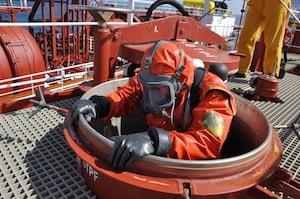Confined Spaces

Confined spaces are dangerous places! They are typically small spaces in which a worker can get mangled by moving parts, buried by debris, or asphyxiated by toxic substances or lack of oxygen. Tanks, silos, storage bins, hoppers, vaults, excavations, and pits are just a few examples of places that are legally designated as confined spaces. The Washington Department of Labor and Industries has defined a confined space as any space that has all three of the following characteristics:
- is large enough for an employee to fully enter;
- has a limited or restricted entry or exit; and
- is not primarily designed for human occupancy.
WAC 296-809-100.
In Washington State, every employer who controls a confined space or who sends an employee into a confined space is legally obliged to conduct an inspection of the confined space and determine whether the space poses a danger to the life or health of those who enter it – before ever allowing worker to enter the confined space. WAC 296-809-20002. The purpose of the inspection is for the employer to obtain the facts necessary to label the confined space a “nonpermit” confined space or a “permit-required” confined space. “A nonpermit confined space is a confined space that does not contain actual hazards or potential hazards capable of causing death or serious physical harm.” WAC 296-809-20002.
A permit-required confined space is a confined space that has one or more of the following characteristics capable of causing death or serious physical harm:
- a potentially hazardous atmosphere;
- a material that might engulf someone inside the space;
- an internal configuration that might trap or asphyxiate someone;
- a physical component that might shock, cut or crush someone; or
- any other recognized safety or health hazard that could impair the ability of the person inside to exit without help or could pose an immediate danger to the life or health of that person.
WAC 296-809-20002.
Every employer who controls a permit-required confined space or who sends a worker into a permit-required confined space must follow a very stringent set of safety rules. Those rules must be written down and employees must be trained to follow those rules before the employer allows anyone to enter the confined space. It does not matter where the confined space is located. If the confined space is in Seattle, Tacoma, Olympia, Bellingham, Marysville, Everett, Centralia, Longview, Vancouver, Ellensburg, Wenatchee, Yakima, Richland, Walla Walla, Spokane, or any other location within the state’s borders — that is not located at a federal facility on federal land — the regulations established by the Department of Labor and Industries apply and will be enforced.
Among the many things that the employer or other company controlling the jobsite must do – at a minimum – to protect workers are the following:
- lock or seal the confined space to prevent unauthorized entry;
- place warning signs visible to those who would enter the confined space;
- have a written confined space plan that specifies the means, procedures, and practices to be used by workers authorized to enter the confined space;
- provide workers with all documents/information concerning the hazards and/or hazardous substances/equipment inside the confined space;
- fully train workers on how to safely enter and work in the confined space, and certify that they have received and have understood the training before allowing them to enter the confined space;
- provide a means to rescue workers who enter the confined space; and
- allow entry into the confined space by permit holders only, making sure that the permit specifies exactly what the worker is to do inside the confined space, how the workers is supposed to do the work, and how long the worker has to complete the work.
WAC 296-809-30002.
The lawyers at Kraft Davies Olsson PLLC have successfully represented workers – and the surviving family members of workers – who sustained injuries or were killed as a result of violations of construction industry safety standards. We are familiar with the safety standards that apply to these cases and offer a free case evaluation. If you or a loved one has suffered such an injury, call us at 206.624.8844 for a free consultation. We want to speak with you to see if we can help.







